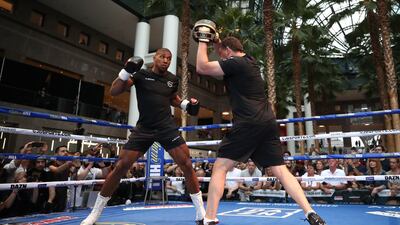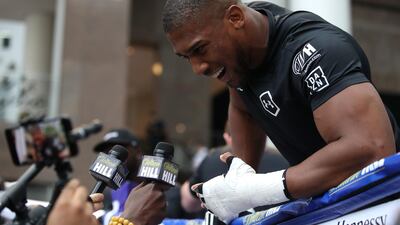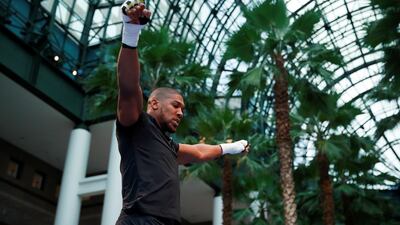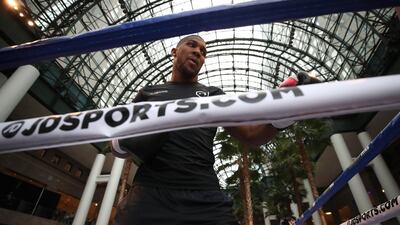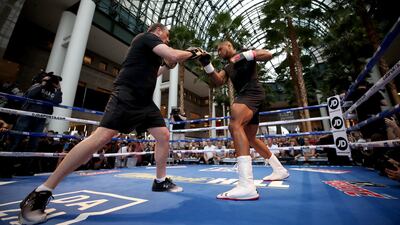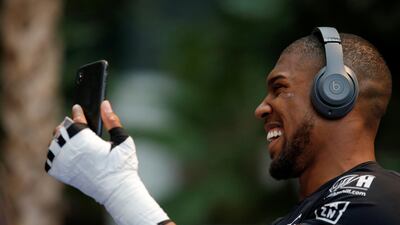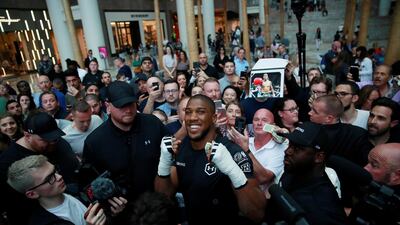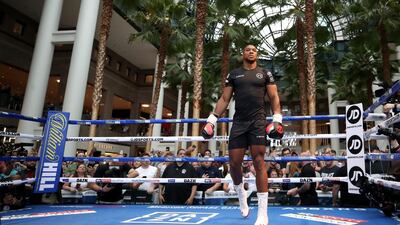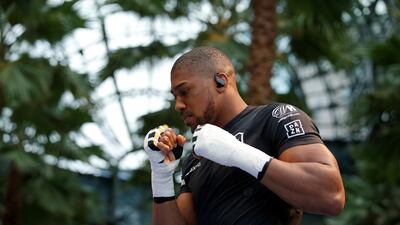It should have been the next step in Anthony Joshua’s bid for global domination, but it has fast become the fight that no one really wants to see.
Joshua defends his WBA, WBO and IBF heavyweight titles against Andy Ruiz Jr at Madison Square Garden, New York. An American debut at boxing’s historic home has become an example of boxing’s endless capacity to self-harm.
There are three elite heavyweights in the world right now – Joshua, Deontay Wilder, the WBC champion, and Tyson Fury. At present estimates, it will be summer of 2020 at the earliest that any will meet each other. There is too much easy money to be made in the sport right now for any to take a risk.
With that background, Ruiz, a short-notice substitute after Jarrell Miller failed three drug tests, doesn't really make the grade. Joshua and Eddie Hearn, his promoter, are well aware of that, so a conference call for a select group of the world's media last week was preceded with a plea to just ask questions about Ruiz.
The first attempt by Joshua to knock back a question about Wilder was lost in the background crackle that always seems to accompany such calls. Dismayed at being asked the same question again, Joshua succumbed to the inevitable.
“It’s not complicated - he has got the belt I want, I’ve got the belts he wants,” Joshua said. “He has been calling my name out for the last year or so. Why shouldn’t that fight happen? I’m an honest person. If I didn’t want to fight Wilder, I’d say I’m not ready, I’m not experienced enough. I am experienced enough to compete with Wilder. Whenever he is ready, I’m ready.”
Joshua was last in action last September, when he stopped Alexander Povetkin at Wembley Stadium. He was on top of the world that night, feeling he was able to shout the odds to Wilder, while former champion Fury, two fights into his comeback after two-and-a-half years out of the ring and a failed drugs test, was just a sideshow.
Things changed when Wilder and Fury fought to a thrilling draw in December. They no longer believe they need him.
The pair had looked set to meet in a return last month, until Bob Arum, the promoter, waved a huge contract in front of Fury to sign with ESPN, the US cable television station. As a result, he now faces Tom Schwarz, a virtually unknown German, in Las Vegas on July 15.
From a financial point of view, it is easy to understand. Why, after all, take on a massive puncher like Wilder for around $25 million (Dh91.8m), when you can box Schwarz and then two more similarly simple tests for approximately $15 million each?
Fury has another fight pencilled in his diary for September and could be out again at the end of this year or early next. With that standard of opposition, the only way the Wilder rematch is going away is if Wilder loses.
Even at 87, Arum is happy to play a long game, and hopes to build Fury in the consciousness of the American sporting public until they can maximise their income with a Wilder rematch.
The flaws in that plan were exposed by negotiations for a Floyd Mayweather-Manny Pacquiao fight, which dragged on for years, the pair finally meeting when both were well past their best.
Meanwhile, Wilder will box Luis Ortiz later this year and is rumoured to have Adam Kownacki, an unbeaten Polish heavyweight, lined up for early next year, part of a three-fight deal he is said to have agreed with Showtime, ESPN’s rival. Wilder could be ringside for Joshua on Saturday. Joshua does not seem to care.
“Whether he is there or not is irrelevant and I don’t think he is going to fight me next,” Joshua said.
Ruiz is an uninspiring challenger. Some say he was unlucky when he lost on points to Joseph Parker for the vacant WBO title in 2016, but the ease with which Joshua handled Parker last year leaves that form rather exposed. The Mexican-American followed that defeat with a 15-month absence from the ring. He looks in poor shape, too.
The biggest risk is complacency. That has happened before in heavyweight boxing. Muhammad Ali lost to Leon Spinks, Mike Tyson to Buster Douglas and Lennox Lewis to Hasim Rahman, all when their minds were on other things.
Joshua insists he has things under control. He can often seem a constant presence on television in the UK, appearing in adverts for sport drinks, but he guards his gym time religiously.
Media duties are squeezed to the minimum and if you are not a “partner” or paying for the privilege, chances of getting an exclusive are slim. He hasn’t given a one-on-one interview to a UK newspaper in more than three years.
The fight will be screened in the US on DAZN, a streaming service that handed Hearn $1 billion to launch his business into America. Hearn says Joshua is only on a fight-by-fight deal with the company, though. “We won’t agree anything that could prevent a Wilder fight from happening,” Hearn said.
With a Wilder fight off the table, Joshua may be left facing Kubrat Pulev in his next fight in November, after Oleksandr Usyk, the undisputed world cruiserweight champion, was forced to delay his heavyweight debut because of injury. Usyk looks one fighter capable of mixing with any one of the big three.
“It can go 12 rounds, or one round, but on your record it is a win and that is what is important,” Joshua said. “I’m just focusing on getting the win.”
A win might not be enough. Wladimir Klitschko didn’t box in the US for seven years after beating Sultan Ibragimov in a world title unification at the Garden in 2008. He may have won another belt, but the fight was a stinker. To stay as the top dog, Joshua needs to excite.
